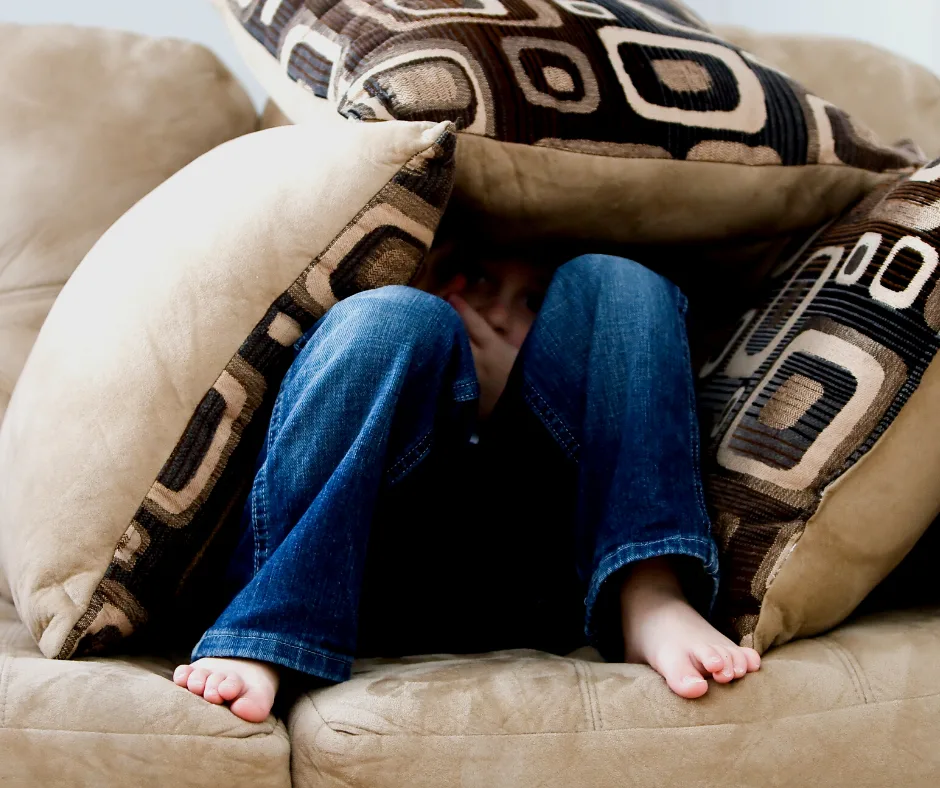Like many newly weds, my parents got a puppy. That puppy was given the name Champion, and he was treated like a king. Well, for a few years.
My parents promptly had 5 children (the oldest being me), and that dog got less and less attention. He was thrown in the basement when any of us were eating food (which to be honest was probably the majority of the time). His sleeping space got moved from my parent’s bed to the basement couch.
That sweet dog’s life goal became finding the opportunity to sneak through an open door and run away until he couldn’t run anymore.
Right about now, I expect that you are asking yourself why I am talking about my childhood dog.
Boundaries, rules, and restrictions are good, but they can be draining and confining.
Our children, most likely, will not run out the door if we are being too strict of a parent; however, they show other negative signs.
Are You too Strict of a Parent?
Child-raising specialist Laura Markham explains (in her “What’s Wrong with Strict Parenting?”, n.d., Aha! Parenting.com ) that studies on discipline consistently show that strict parenting actually produces kids with lower self-esteem who behave worse than other kids.
If parents pay close attention, there are plenty of signs that they are setting too many boundaries and restrictions. These are 5 common signs that you are too strict of a parent:

1. You never ask for your kid’s opinion or input
Are you a my-way-or-the-highway parent? If you rarely ask for your child’s input on things, then you may be.
Kids will model our behavior. If we parent with fear (or “you WILL do as I say”) we are teaching our kids that bullying is the best way to get others to listen. If you parent by yelling or setting super strict boundaries, your child will try to communicate with others in this way.
This type of parenting style, also known as authoritarian, has been shown to raise kids who only rebel later in life.
Try this: Ask your kids how they feel regularly. “Where do you think we should go for dinner?” or “Is there a movie you would like to see tonight?”
2. You focus on rules, routines, and restrictions
“The more you live within your tight comfort zone, the harder it is to break out.“
Some routines can give kids a sense of security. They know what to expect and when. However, unbending rules and firm routines can hamper a child’s ability to develop resilient qualities.
Some freedom will teach kids how to be flexible and handle different situations in life – that don’t follow exactly what they expected.
Try this: Observe some other families around you. Are other kids allowed to play outside “past bedtime” on a Friday night while your kids must not stray from a routine? Try allowing your kids to break routine on weekends.

3. You reward outcomes and not efforts
Often strict parents create a “black and white” or “right or wrong” atmosphere. In reality, there is a lot of gray area in life. A child who ‘lost’ or ‘failed’ may have worked very hard and deserves praise.
Children who are only rewarded for outcomes, and not efforts, develop priorities that reside in winning. The feel more pressure and anxiety.
Try This: Make it a point to tell your child that you are proud of them. Explain to them that winning isn’t everything. If they get a C on their test, despite studying, acknowledge their work and work together to think of a solution.

4. You frequently catch your kid in a lie or argument
Kids who are punished every time they make a mistake will learn to do anything they can to avoid consequences.
They become incredible liars.
They are often found tangled in arguments with other kids because they grow to believe that power and control is the key to a relationship. Also, they are frequent tattletales for this same reason.
Try this: If you regularly catch your child lying or having trouble getting a lot with other kids, it is time to talk to them about why they feel the need to avoid the truth.
5. Emotional Outbursts are Common
We all know them. The family of “screamers”. The parents are screaming, and the kids are screaming. All of the time.
Strict parenting hampers a kid’s ability to self-regulate their own emotions. When kids are controlled fully, they don’t develop important life skills such as self-discipline, conflict resolution, or impulse control.
Studies have even linked strict parenting styles to depression in children.
Try this: Take a moment to calm yourself down before disciplining your child. Approach them in a calm manner instead of with anger and punishment.
So, What Parenting Style Does Work?
We know that routines and limitations are healthy for children, but too many rules and restrictions can hinder your child from developing emotionally. So, what do we do?
- Balanced, realistic routines– for example, children have to follow a specific bedtime during the week, but can stay up later on weekends.
- Logical expectations – age appropriate chores, being kind to family members
- Disciplining with natural consequences – “if you don’t wear your coat you will be cold” instead of “if you don’t wear your coat you will be grounded for a week”
Final Thoughts on Parenting Too Strict
Treat your child with respect by listening to them and having open conversations, and you will receive respect in return. And- you will avoid raising a child who wants to run out the door, like my childhood dog.